Class of 33
Edinburgh college pioneers course for dental care assistants aimed at giving young people and those with no formal qualifications the opportunity of a career
Giving more opportunities to more people makes for a healthy dental sector. A new course run by Edinburgh College is giving those with the right attitude and ambition, and no formal qualifications, the chance to take the first steps in a dental career.
The introductory Dental Care Assistant course claims to be the first of its kind in Scotland and its first cohort of 33 students completed in January 2016.
As Tom MacGregor, Curriculum Manager, Health & Vets, explained, the course is designed to complement the College’s SVQ 3 in Dental Nursing and create the option of a pathway for aspiring dental nurses. “This provides opportunities for young people and those with no formal qualifications to get a foot on the ladder. We are giving them a grounding and allowing them to build core skills.”
This provides opportunities for young people and those with no formal qualifications to get a foot on the ladder
Tom MacGregor , Curriculum Manager
The programme is delivered by dental nurse lecturers Caroline Hairs and Elaine Finnie. Caroline explained its content: “Overall, it’s a broad qualification and useful if students want to go further in dentistry, or go on to work in a health-care environment.
“As far as knowledge and understanding are concerned, the core elements of the course are based around oral health. We help students find their way around their own mouths, how to look after their mouth, and understand the four key messages: reduce frequency of sugar intake; visit your dentist regularly; brush your teeth twice a day; don’t smoke.”
Equally important, particularly from an employability point of view, is the course’s focus on prevention of infection.
“This is a key part of a dental nurse’s responsibility,” added Caroline. “Elaine and I regularly visit local practices and we see people without formal qualifications in infection prevention being employed to work in local decontamination units (LDUs). We provide certificated learning, delivered to SQA Level 5 that introduces students to the microbiology of infection. Among other things, that gives them a head start in the jobs market.”
Practical work plays an important part in the course, which also includes a unit on dental check up. Caroline added: “Again, it’s very simple. Students learn about the quadrants of the mouth and dental instruments – simple set-ups for a check-up, scale and polish, and filling.” Reflective classroom activity, including being presented with specific scenarios, provides students with the opportunity to underpin their learning.
As well as covering the basics when it comes to dental knowledge, the course includes other essential tuition. Tom explained: “Future employment opportunities were at the heart of our thinking when we designed the course. Accordingly, we work very closely with the College’s core skills team to incorporate elements of communication, numeracy and IT – every dental nurse registrant must be equipped with fundamental know-how in these areas.”
That focus on employment also sees students go through the PVG (Protecting Vulnerable Groups) Scheme and Hepatitis B vaccination process.
In demand
It appears that demand for the course has been clear for some time. Caroline said: “Elaine and I have both recently completed our TQFE (Teaching Qualification in Further Education) at Aberdeen University and I concluded my BA in Professional Development. Working entirely independently, we both identified the need for a lower-level course to give young people the chance to prepare for vocational qualifications.”
Fortunately, that point of view chimed with the College’s own curriculum reviews, and when Tom joined the team he was of the same mind. All three set about designing the new course – Elaine and Caroline contributing their clinical skills and health knowledge, Tom his expertise in education and college procedures.
During that process the links that have been established with local dentists and dental practices proved useful. Caroline added: “We have set up relationships with a series of practices over time, as graduates go on to work and we look to set up work experience for current students. We were able to conduct market research – talk to practices about what they wanted and needed and where they felt there were gaps in student ability.”
The team’s observations about demand proved accurate. On launch, the course attracted approximately 100 applicants for 40 places. The initial cohort, which has experienced a limited amount of churn (33 out of the initial 40 have completed), saw students travel from as far afield as Biggar to take part in the 18-week, full-time course.
- Tom MacGregor
- Some of the first successful cohort of students who are now ready to move on with further learning or go out to work in the profession
- The programme is delivered by dental nurse lecturers Caroline Hairs and Elaine Finnie (above)
- The programme is delivered by dental nurse lecturers Caroline Hairs (above) and Elaine Finnie
- The course is based around oral health and the students learn about the quadrants of the mouth, dental instruments and simple set-ups for a check-up
Today’s mobile workforce and high levels of immigration from the EU were reflected in the first set of applications received. Tom said: “We get a lot of students from Europe who don’t have English as a first language, but we are still able to take that into account by working with colleagues in ESOL (English for speakers of other languages).”
A new intake began the course in January. Again it was full, and this time around it included one male student.
Although there’s no need for formal qualifications, applicants are interviewed. “We look for smart people interested in dental health and hygiene,” said Tom. “Crucially, we are also on the lookout for people skills. There are a lot of good people out there with high levels of technical knowledge, but fewer with highly developed chairside skills, and that’s an area we concentrate on. We’ve found that once they’ve undergone their course our students are very comfortable talking to people about dental health and hygiene.”
Next level
On completion it is expected that most students will go on to take the next level of dental nursing tuition at the College. However, they have the option of finding employment as a dental nurse and returning as a day-release student. Alternatively, they could become a clinical support worker in an LDU, work at a lower level within a dental team, or work in other areas of healthcare.
“A lot of people come to us from a background where they have done some care work, community support, or worked in hospitals as domestic assistants,” said Tom. “If they want to return to work in that environment that’s fine. However, every member of our first intake expected to come back to us in August to continue with their education.”
Despite the apparent early success, and the fact that the course has only been up and running for a few months, there are plans to review what has worked well and where improvements can be made. Tom said: “Very soon, we will have a self-evaluation week where we will look at how the course went, what was successful and what wasn’t and what we can do to make any necessary change.
“We also invite stakeholder feedback and that will include the views of people in the sector. Indeed, we have a lot of information already, a combination of structured and anecdotal feedback from practices. The evaluation process is a very formal one and results will be published in the public domain. The College aims to respond to what employers and the profession needs.”
Part of the next moves will be developing the College offer. For the academic year 2016/17 there are plans to incorporate a Dental Care Assistant level 2. “It’s important to see what more we can do,” said Tom. “For example, we are also exploring the idea of a ‘before dental care assistant’, in other words, a link between the College and local schools that will allow S3s and S4s to progress onto the dental care assistant programme. Whether that’s delivered in school, here at College or a combination of both we can work out.”
Should the plans come to fruition the College will be providing a complete pathway: school-level provision, Dental Care Assistant 1, Dental Care Assistant 2 and SVQ Level 3 (the registrable course).
This concept has struck a note with other curriculum managers who, Tom said, are talking about the model that has been developed and thinking about how they can apply it to their area of responsibility.
Ready to move
“The important thing to bear in mind is that we have 33 students who at this time last year had no opportunity to study dental health at Edinburgh College because they didn’t have the qualifications. Now, they are ready to move on with further learning or go out to the industry. This year, in total, the course will provide education for around 50 students. Come next year we would look to double that number by following through on our ideas for local school links and Dental Care Assistant 2.”
Caroline agreed that there is every opportunity to follow up on that ambition. “From a teaching point of view we will always come across new challenges, especially when we are targeting people with no formal qualifications, or have English as a second language. Whatever the barriers, I’m sure we will find our way around them and give more people the chance to work in this great profession.”
Career decisions confirmed
“I’ve loved the course and it has strengthened my determination to be a dental nurse.” That’s the view of Jayne Mooney (26), one of the students who recently completed the new Edinburgh College course.
It’s a sentiment supported by her classmates. Monica Miranda (31) said: “This has really given us an idea of what you come across day to day in a dental practice. It’s been a real eye-opener and given me even more drive to see what the job’s really like.”
And Pooja Singh (18) added: “I’ve always wanted to do dental nursing and came here to see if I’d enjoy it. It’s confirmed that I do.”
All three plan to move on to the College’s SVQ (Scottish Vocational Qualification) course. Meantime, there are plans to gain more experience by seeking out trainee or placement roles.
They are at different stages of life; for example, Pooja has recently left school, while Monica is married with two young children. However, they’ve found that the course has given them the grounding they feel they need.
Jayne concluded: “It’s been a great decision to come here and I can’t wait to sit the next course.”
Magic moment
In teaching, tutors often talk about ‘magic moments’. For Caroline Hairs and Elaine Finnie just such an occasion occurred before Christmas 2015 when, during a dental-health event staged at the College, their students demonstrated what they’d learnt in public for the first time. “They coped admirably,” said Caroline. “It was quite humbling. They were answering questions about brushing properly and so on, and were clearly enjoying it. Although they were nervous beforehand, there were big smiles on their faces during the event.”

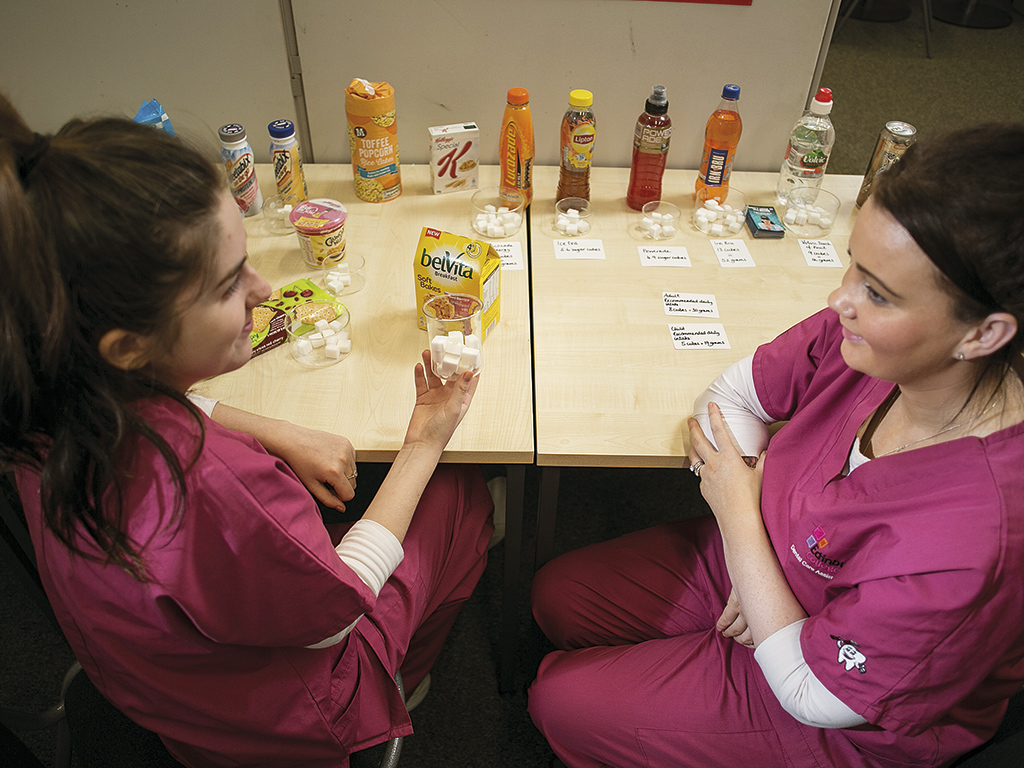
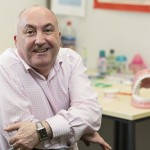
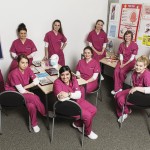
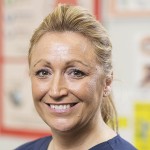
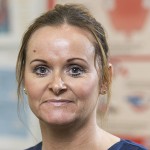
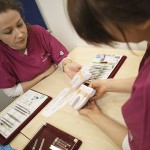
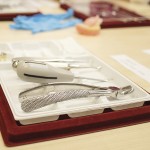
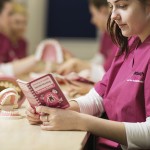
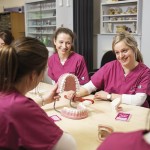
Comments are closed here.